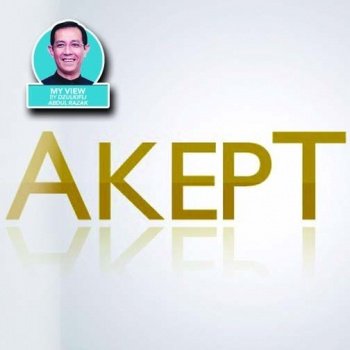The fine art of picking VCs
Professor Tan Sri Dato' Dzulkifli Abdul Razak
My View - The Sun Daily
June 7, 2017

THE selection of vice-chancellors (VCs) in local universities has been a subject of contention for some time now. It is often said to be tainted by partisan politics giving rise to speculation as to the process and intent. It comes to a boil when the person selected proves to be more of a “politician” and a pseudo-academic at best. It is obvious that the selection process is somehow flawed.
However more recently with the new leadership at the Akademi Kepimpinan Pengajian Tinggi (Akept) the issue has been diffused to a large extent, thanks to efforts to put in place a more systematic and objective profiling system that has been specifically designed and implemented.
Given the strong support from the minister of higher education, the system has been applied and rigorously fine-tuned step by step to produce more discerning outcomes.
This makes the selection process more holistic and comprehensive, not just relying on “subjective” interviews, but backed up by information that gives the decision-making process greater latitude and reliability. The impact can be seen from a number of bold leadership changes in several universities lately.
Overall it augurs well because to a larger extent the decision is more professional and independent (read: depoliticised), although admittedly there is still room for improvement. This fact is well noted as Akept continues to take up various other challenges while strengthening values and ethical components as part of the integral assessment.
The task in ensuring that the challenges are squarely met is never an easy one. But it can be made more difficult if politicians remain insensitive to the efforts by the ministry via Akept.
Of late, we still read how some politicians continue to try to influence the selection of VCs by weighing in their vested local political interest at the expense of education in the broadest sense. Missing this point, such a demand unfortunately tends to be myopic in nature and works against “quality” education in the long run.
Few seem to realise that unlike political parties where local leadership from the grassroots community is preferred to remain viable, this is not so for universities by and large. In fact, it is more often the converse because education thrives on diverse ideas and the cross-fertilisation of best practices observed from different cultures. Simply put, the more open and independent the system, the better it is for education and the selection process for vice-chancellors; thus the eventual choice that must be made.
Indeed, the reverse is equally true. For example, when an undeserving candidate is “parachuted in” to take the top post, the university ultimately suffers. Evidence of this abounds primarily because slipshod decisions have led to low morale that translates into dismal performances which could have been avoided. Instead it is compounded by the fact that the person “parachuted in” is emboldened by the false perception that “performance” is less important than “patronage” which then becomes his or her preoccupation to hog the “position”. Once embedded such political culture will corrupt and displace its academic version making nonsense of the academe. In short, once a “wrong” leader is chosen, the university begins to (mis)behave more like a political entity. Yet we wonder why the dismal performances?
That said, all is not lost if only the politicisation of education in general, and universities in particular, is stopped immediately. Politicians must keep their distance if they are not able to understand and appreciate what academic culture is about. More ironic is that some of them were formerly academics. Why they are unable to fathom the predicament boggles the mind. Perhaps it is due to the “corrosive” nature of politics.
While in realpolitik ethics are minimally observed if at all, the academe is all about ethical imperative which is the soul of education.
So we must learn to respect Akept and the Ministry of Higher Education in fulfilling their duties without fear or favour; to further refine the selection of VCs based on the plan that they have been mandated to do is one of many. This is vital if education, especially higher education, is to make a real difference. Like it or not it is intimately linked to the “right” leadership sans political encumbrances.
As such the selection must also be swiftly executed as a mark of confidence and in the “right” way so as to avoid unwarranted scepticism and cynicism – often a potent signal that all is not well. This is certainly an unfortunate misreading of the steady effort invested by Akept so far in making the selection of VC’s as professional as possible.
